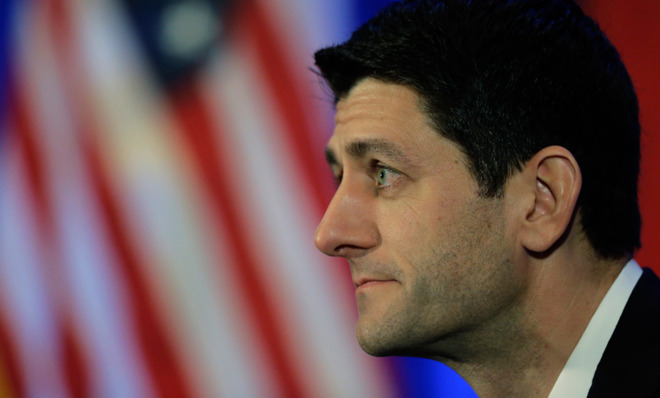Can Paul Ryan's poverty blitz survive contact with reality?
The latest iteration of compassionate conservatism is more spin than substance


A free daily email with the biggest news stories of the day – and the best features from TheWeek.com
You are now subscribed
Your newsletter sign-up was successful
When Mitt Romney stood before a dining room full of well-heeled Republican donors and casually slagged off half the American population as incurable parasites, he unwittingly triggered a wave of public concern among Republicans about the plight of America's poor. The Washington Post reported in November that Rep. Paul Ryan (R-Wisc.), supposedly "mortified by Romney's 47 percent remarks," was putting together an anti-poverty plan as part of a "more inclusive" vision for the GOP. That was followed by Sen. Marco Rubio (R-Fla.) delivering a much-hyped speech on poverty in early January. Republicans, stung by Romney's plutocratic gaffe, wanted people (or journalists, at least) to know that they cared about the poor, too.
As far as PR goes, it worked pretty well. Beltway reporters and pundits began talking about the new Republican focus on poverty. Ryan scored interviews with network anchors, newspaper op-eds, and a speech at Brookings. He used them to rail against Lyndon Johnson's War on Poverty and to drop hints at a "new direction" for alleviating the plight of America's poor. Absent from all of this was any concrete policy proposal on how to achieve that end.
This week, however, Ryan took the first step from rhetoric to policy with a 200-page report on the state of federal anti-poverty programs. It doesn't lay out any proposals, but it does at least offer a glimpse at the areas of federal spending that Ryan will try to eviscerate, allegedly in the cause of aiding the poor. And while the shift from pure PR to matters of substance was small, it's already caused Ryan to stumble.
The Week
Escape your echo chamber. Get the facts behind the news, plus analysis from multiple perspectives.

Sign up for The Week's Free Newsletters
From our morning news briefing to a weekly Good News Newsletter, get the best of The Week delivered directly to your inbox.
From our morning news briefing to a weekly Good News Newsletter, get the best of The Week delivered directly to your inbox.
Ryan's report looks at a variety of federal programs and throws some selectively cited data points at them in an attempt to gauge their effectiveness at relieving poverty. A few easily impressed reporters sat in awe at the sheer length of the report — CNN called it a "comprehensive analysis" — but when other journalists dug into Ryan's methods and sources, some serious problems emerged.
Rob Garver of the Fiscal Times called up a few of the economists cited in Ryan's report, and said they had "reactions ranging from bemusement to anger at Ryan's report, claiming that he either misunderstood or misrepresented their research." As Garver noted, Ryan argued that the War on Poverty has been ineffective despite its high cost, but to make this argument he "seemed to arbitrarily chop off data from two of the most successful years of the War on Poverty."
Salon's Brian Beutler observed that the metric Ryan used to measure the war on poverty's effectiveness excludes some highly effective anti-poverty measures, and seemed "designed to create a false impression that tons of money has been wasted, when really it's done exactly what it was supposed to."
Indeed, the War on Poverty has actually been pretty successful. The Center on Budget and Policy Priorities — which Ryan cited several times throughout his report — observed back in January that when you factor in the non-cash and tax code benefits that make up an increasingly large portion of the safety net, "the poverty rate fell from 26 percent to 16 percent" between 1967 and 2012. (CBPP blasted Ryan's report as "replete with misleading and selective presentations of data and research.")
A free daily email with the biggest news stories of the day – and the best features from TheWeek.com
The Supplemental Nutrition Assistance Program (known more commonly as the food stamp program), a fat target of previous Ryan budgets and singled out in Ryan's poverty report as largely ineffective, is actually pretty good at pulling people out of poverty. Once again we turn to CBPP, which found that SNAP kept 4.9 million people — 2.2 million of them children — out of poverty in 2012.
The fact that academics and journalists are already finding errors and omissions in Ryan's math doesn't bode well for the coming policy portion of his anti-poverty crusade. The thing to remember about Ryan's misleading attacks on the War on Poverty is that they're born of necessity. Ryan's ideology won't allow for the success of social safety net programs — he believes they provide "disincentives" to work and turn people into wards of the state.
To dismantle that safety net, he has to argue that it has failed the people it was designed to help. And the only way to do that is through the sort of creative manipulation of data on display in his report.
Simon Maloy is a political writer and researcher in Washington, DC. His work has been published by The Huffington Post, The American Prospect, and Salon.
-
 5 cinematic cartoons about Bezos betting big on 'Melania'
5 cinematic cartoons about Bezos betting big on 'Melania'Cartoons Artists take on a girlboss, a fetching newspaper, and more
-
 The fall of the generals: China’s military purge
The fall of the generals: China’s military purgeIn the Spotlight Xi Jinping’s extraordinary removal of senior general proves that no-one is safe from anti-corruption drive that has investigated millions
-
 Why the Gorton and Denton by-election is a ‘Frankenstein’s monster’
Why the Gorton and Denton by-election is a ‘Frankenstein’s monster’Talking Point Reform and the Greens have the Labour seat in their sights, but the constituency’s complex demographics make messaging tricky
-
 The billionaires’ wealth tax: a catastrophe for California?
The billionaires’ wealth tax: a catastrophe for California?Talking Point Peter Thiel and Larry Page preparing to change state residency
-
 Bari Weiss’ ‘60 Minutes’ scandal is about more than one report
Bari Weiss’ ‘60 Minutes’ scandal is about more than one reportIN THE SPOTLIGHT By blocking an approved segment on a controversial prison holding US deportees in El Salvador, the editor-in-chief of CBS News has become the main story
-
 Has Zohran Mamdani shown the Democrats how to win again?
Has Zohran Mamdani shown the Democrats how to win again?Today’s Big Question New York City mayoral election touted as victory for left-wing populists but moderate centrist wins elsewhere present more complex path for Democratic Party
-
 Millions turn out for anti-Trump ‘No Kings’ rallies
Millions turn out for anti-Trump ‘No Kings’ ralliesSpeed Read An estimated 7 million people participated, 2 million more than at the first ‘No Kings’ protest in June
-
 Ghislaine Maxwell: angling for a Trump pardon
Ghislaine Maxwell: angling for a Trump pardonTalking Point Convicted sex trafficker's testimony could shed new light on president's links to Jeffrey Epstein
-
 The last words and final moments of 40 presidents
The last words and final moments of 40 presidentsThe Explainer Some are eloquent quotes worthy of the holders of the highest office in the nation, and others... aren't
-
 The JFK files: the truth at last?
The JFK files: the truth at last?In The Spotlight More than 64,000 previously classified documents relating the 1963 assassination of John F. Kennedy have been released by the Trump administration
-
 'Seriously, not literally': how should the world take Donald Trump?
'Seriously, not literally': how should the world take Donald Trump?Today's big question White House rhetoric and reality look likely to become increasingly blurred
